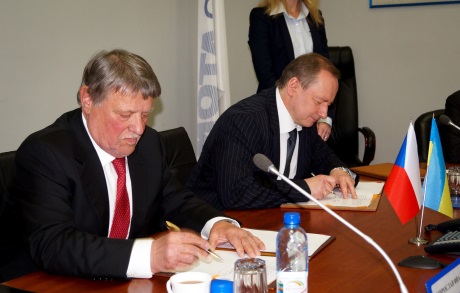Energoatom and Škoda extend links
28 October 2014
Ukrainian nuclear power plant operator Energoatom and Czech engineering company Škoda JS have signed a memorandum of cooperation and an agreement on confidentiality.
 |
| The documents were signed on October 23 by Energoatom president Yuri Nedashkovsky and Škoda JS chief executive officer Miroslav Fiala (Image: Energoatom) |
Skoda JS has also agreed to supply equipment for unit 6 of Ukraine's Zaporozhe nuclear power plant, Energoatom added.
The memorandum includes cooperation in the construction, operation and maintenance of nuclear power plants; scientific and technical cooperation in the peaceful use of nuclear energy; increased security, reconstruction and modernization of nuclear power plants; extending the life of nuclear power units; management of used nuclear fuel and radioactive waste; and the training of nuclear power plant personnel.
Nedashkovsky said the signing of such documents usually takes place at the beginning of cooperation with new partners.
"But with Škoda it's a totally different story - [the company] is our long-standing partner, we worked with them even during the difficult 1990s when the problem of non-payment for electricity we supplied meant we could not [afford to] pay for equipment in a timely manner. Our Czech partners were sympathetic about our difficulties and fixed prices for Energoatom. In more successful periods, when the economy of both countries grew, our cooperation developed more intensively."
For example, the Czech Export Bank helped Energoatom fund equipment purchases and scientific and technical developments, he said. "Today, Ukraine has fallen on hard times, but as before, Škoda has remained our reliable partner. In signing the memorandum of cooperation, we do so not to complete our long-term cooperation, but to give new impetus to our further cooperation."
Fiala said Škoda JS had been working with Energoatom for about 20 years.
"Over the years, Škoda's experts established personal contacts with the personnel of Ukrainian nuclear power plants that use our equipment. In the first half of the 1990s, when Škoda was looking for new markets, the then director of the company took his Škoda Favorit car and personally visited all the Ukrainian nuclear power plants – these were the first steps to future cooperation with Energoatom. Since then, we have installed a lot of equipment at Ukrainian nuclear power plants."
The ambassador of the Czech Republic in Ukraine, Ivan Pochuh, who was present at the signing ceremony, said: "In the difficult political and economic conditions in which Ukraine finds itself today, it is very important not to stop Czech-Ukrainian cooperation in such an important strategic direction as nuclear energy. It may seem to many people in the Czech Republic that it is too hard to work in Ukraine today, but I am sure that, despite all the difficulties, cooperation between Czech and Ukrainian enterprises should continue. The signing of the memorandum between Energoatom and Škoda is the best proof of that."
But Škoda JS later stressed the scope of the new agreements.
The Plzeň-based company said on 24 October: "In connection with recent information in the press regarding the continuation in cooperation between Škoda JS and Energoatom, we consider it necessary to state that such negotiations are conducted within the intergovernmental dialogue between the government of the Czech Republic and Ukraine. Škoda JS has positive long-term experience in fruitful cooperation with the Ukrainian nuclear industry, but to date, there has not been signed any new contract for the construction of new nuclear units in Ukraine.”
Ukrainian Prime Minister Areseniy Yatsenyuk last week told Energoatom management to speed up construction of new nuclear reactors and to enlist the help of "European partners" rather than Russia.
Energoatom and Russia's Atomstroyexport signed a contract agreement in February 2011 for the completion of two reactors at the Khmelnitsky nuclear power plant, which followed an intergovernmental agreement signed in June 2010. In October that year, Russia's Sberbank said it was willing to lend Energoatom $1 billion, with Ukraine meeting 15% of the cost of the project. Energoatom said in May 2011 it was not satisfied with the interest rate of the proposed loan and in August this year, Nedashkovskiy said Ukraine would not cooperate with Russia on construction of Khmelnitsky 3 and 4. Nedashkovskiy also said Energoatom would prepare a plan for the units, including a strategy to export the electricity they generate to Europe. At a televised Cabinet meeting on 22 October, Yatsenyuk said the project will be implemented by Škoda.
Researched and written
by World Nuclear News